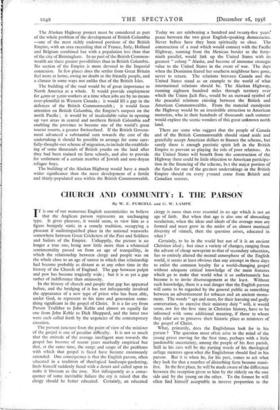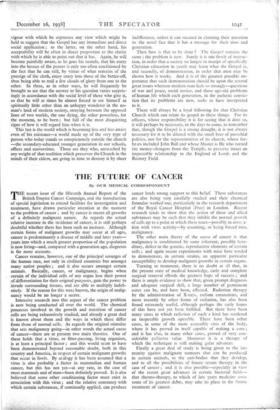CHURCH AND COMMUNITY: I. THE PARSON
By W. E. PURCELL and G. W. LAMPE
I T is one of our numerous English eccentricities to believe that the Anglican parson represents an unchanging type. It gives pleasure, it would seem, to view him as a figure benignly static in a comely tradition, occupying a pleasant if undistinguished place in the national waxworks somewhere between Great Cricketers of the Past and Soldiers and Sailors of the Empire. Unhappily, the picture is no longer a true one, being now little more than a whimsical sentimentality passed on from an age of tranquillity, in which the relationship between clergy and people was on the whole close to an age of unrest in which that relationship had become probably as distant as at any other time in the history of the Church of England. The gap between pulpit and pew has become tragically wide ; but it is as yet a gap rather of indifference than animosity.
In the history of church and people that gap has appeared before, and the bridging of it has not infrequently involved the appearance of a new type of priest who has been able, under God, to represent to his time and generation some- thing significant in the gospel of Christ. It is a far cry from Parson Trulliber to John Keble and almost an equally far one from John Keble to Dick Sheppard, and the latter two were each called forth by the urgencies of the contemporary situation.
The present juncture from the point of view of the minister of the gospel is one of peculiar difficulty. It is not so much that the attitude of the average intelligent man towards the gospel has become of recent years markedly empirical but that, at the same time, the range and scope of the problems with which that gospel is faced have become enormously extended. One consequence is that the English parson, often educated in a tradition of theological landscape-gardening, finds himself suddenly faced with a desert and called upon to make it blossom as the rose. Not infrequently as a conse- quence of some inevitable failure the cry is raised that the clergy should be better educated. Certainly, an educated clergy is more than ever essential in an age which is not an age of faith. But when that age is also one of abounding secularism, when the ideas and ideals of the average man are formed and must grow in the midst of an almost maniacal diversity of stimuli, then the question arises, educated in what ?
Certainly, to be in the world but not of it is an ancient Christian ideal ; but since a variety of changes, ranging from the advent of cheap newsprint to that of secondary education, has so entirely altered the mental atmosphere of the English world, it seems at least obvious that any attempt in these days to enlist the common loyalty for a world-changing gospel without adequate critical knowledge of the main features which go to make that world what it so unfortunately has become is to invite discouragement at the least. Without such knowledge, there is a real danger that the English parson will come to be regarded by the general public as something between an advertisement for tobacco and an ancient monu- ment. The words" apt and meet, for their learning and godly conversation, to exercise their ministry duly" will, it would seem, not for the first time in Christian history, have to be informed with some additional meaning, if those to whom they refer are to preserve their historic place as ministers of the gospel of Christ.
What, primarily, does the Englishman look for in his parson ? The question must often arise in the mind of the young priest moving for the first time, perhaps with a little pardonable uncertainty, among the people of his first parish. Still in his ears will be the parting words of his theological college mentors upon what the Englishman should find in his parson. But it is when he, for his part, comes to ask what they look for that a number of disturbing facts become mani- fest. In the first place, he will be made aware of the difference between the reception given to him by the elderly on the one side and by the young on the other. To the former he will often find himself acceptable in inverse proportion to the vigour with which he expresses any view which might be held to suggest that the Gospel has any immediate and direct social application ; to the latter, on the other hand, his acceptability will be often in direct proportion to the clarity with which he is able to point out that it has. Again, he will become painfully aware, as he goes his rounds, that his entry into the houses of the poorer is only too often conditioned by the fact that he can still, by virtue of what remains of the prestige of the cloth, enjoy entry into those of the better-off, thus being able to trail a few clouds of glory from one to the other. In these, as in other ways, he will frequently be brought to, see that the answer to his question varies surpris- ingly in accordance with the social level of those who give it, so that he will at times be almost forced to see himself as spiritually little other than an unhappy wanderer in the no- man's land, of modern society, straying between the opposed lines of two worlds, the one dying, the other powerless, for the moment, to be born ; but full of the most disquieting signs of how it will regard him when it is.
This last is the world which is becoming less and less aware even of his existence—a world made up of the very type of person who today stands so conspicuously outside the church —the secondary-educated younger generation in our schools, offices and universities. These are they who, untouched by any weight of that tradition which preserves the Church in the minds of their elders, are going in time to destroy it by sheer indifference, unless it can succeed in claiming their attention to the novel fact that it has a message for their time and generation.
Then how is that to be done ? The Gospel remains the same ; the problem is new. Surely it is one firstly of instruc- tion, in order that a society no longer in receipt of specifically Christian education in youth may learn what the Gospel is, and secondly, of demonstration, in order that men may be shown how it works. And it is of the greatest possible im- portance that such demonstration should be upon the several great issues whereon modern man feels so strongly—questions of war and peace, social justice, and those age-old problems of human life which each generation, in the pathetic convic- tion that its problems are new, seeks to have interpreted to it.
There will always be a loyal following for that Christian Church which can relate its gospel to these things. For its officers, whose responsibility it is for seeing that it does so, it will perhaps be necessary, in the days to come, to remember that, though the Gospel is a strong draught, it is not always necessary for it to be diluted with the small beer of parochial politics, nor for the representatives of its church, whose for- bears included John Ball and whose Master is He who turned the money-changers from the Temple, to preserve intact an impeccable relationship to the England of Lords and the Rectory Field.















































 Previous page
Previous page